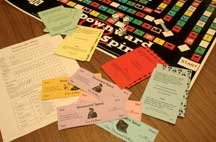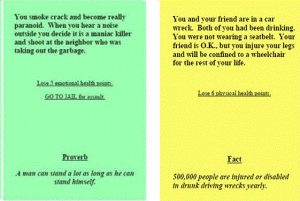Important: Please note that the entire Downward Spiral board game, including the gameboard, cards, and all other materials, is copyrighted by Texas Christian University and cannot be used for any commercial purpose. Terms of use apply.
About the Downward Spiral Game

Downward Spiral is a sole survivor board game, developed by researchers at the Institute of Behavioral Research at Texas Christian University. The game provides substance abuse counselors with an innovative way to motivate clients and open up discussions about the consequences of addiction on themselves and their families. In a game format that resembles the well-known Monopoly™, players roll dice to move across a board filled with potential downfalls related to family, health, friendships, finances and self-esteem, which are described on game cards that players draw. The objective of the game is to stay alive, without losing all social and financial resources due to substance abuse — a task that becomes more challenging the longer the player stays in the game.

Sample cards from the Adolescent Version
of the Downward Spiral board game
The Downward Spiral game focuses on the consequences of substance abuse on a person’s family, friends, finances, self-esteem, health, legal status, and life expectancy (or lack thereof). Each player takes the role of a person who continues to abuse drugs throughout his/her lifetime. The last player left “alive” in the game “wins.” The game uses vignettes as well as facts and quotes to emphasize the consequences amassed in the game (see sample cards above). An after-game discussion helps focus the players on issues that have surfaced during play. The primary purpose is to encourage people to think about the consequences of substance abuse in a personalized but indirect format that looks, on the surface, like fun. With this format, players should feel no need to build counter-arguments, or establish their freedom to use, as can be the case with direct anti-substance abuse messages.
Conceptual Description
The Adult Version of the Downward Spiral game was created as part of a set of activities to motivate clients for treatment as part of IBR’s CETOP Project. Several broad principals came into play in the development of this game (Czuchry, Sia, Dansereau, & Dees, 1997; Dees, Dansereau, & Simpson, 2006). Developers attempted to make the game (a) non-confrontational, (b) meaningful (realistic and relevant), (c) balance interest with serious issues, and (d) require active participation and interaction between participants on more than a superficial level.
The Adult Version was modified as part of the IBR’s Adolescent Project for use with youth in residential, outpatient, and juvenile justice-based treatment settings. Modifications to the Adult Version of the game for use with adolescents included (1) an evaluation and rewording of gameboard cards to reflect scenarios and consequences of drug use relevant to teens, (2) simplification of instructions and game rules for application in adolescent settings, (3) expansion of consequence categories to reflect teen relationships (e.g., girl/boyfriend support), (4) updating personal possessions (e.g., flat screen tv, ipod), and (5) addition of reflection cards with future-oriented recovery scenarios and processing questions for post-game discussion. The Adolescent Version of the Downward Spiral game is included as part of the Treatment Readiness and Induction Program (TRIP).
Implementation and Applications
The Downward Spiral has been used primarily to motivate clients in mandated substance abuse facilities for treatment (Czuchry, Sia, Dansereau, & Dees, 1997; Sia, Dansereau, & Czuchry, 2000; Czuchry & Dansereau, 2005; and Czuchry, Sia, & Dansereau, 2006). The game would be an appropriate adjunct to any substance abuse treatment, as well as treatment of other problems that may have a substance abuse component (e.g., anger management). In each case, the game could facilitate the realistic consideration of consequences of substance abuse.
In addition, the game has also been used with college students who have had their first alcohol or drug infraction. College students who played the game and watched an educational alcohol video reported intentions to change their alcohol consumption behavior more than those who just watched the video (Czuchry, Sia, & Dansereau, 1999). Testing with college students suggests that it would be a useful addition to standard substance abuse education programs. It might also be useful as a part of orientation for college freshmen. The game could be used as is or in modified form in educational, business, and clinical settings to raise awareness of the critical nature of substance abuse. Subsets of cards can be used to individualize the game for specialized populations. For example, if the population focused only on alcohol, then the cards pertaining to other drug use could be left out.
For more information on research implications, see the CETOP Project.
How to purchase the complete game pre-assembled
You may order the Adolescent Version of the Downward Spiral game pre-assembed directly from the Institute of Behavioral Research at Texas Christian University. For more information and ordering instructions, please e-mail ibr@tcu.edu
How to put the game together on your own
The game cards, instructions, and scoring sheet for the Adolescent Version of the Downward Spiral (separate sections) and a printable gameboard are available to download from this Website free of charge.
Selected References
Czuchry, M., Sia, T. L., & Dansereau, D. F. (2006). Improving early engagement and treatment readiness of probationers: Gender differences. The Prison Journal, 86(1), 56-74.
Czuchry, M., & Dansereau, D. F. (2005). Using motivational activities to facilitate treatment involvement and reduce risk. Journal of Psychoactive Drugs, 37(1), 7-13.
Dees, S. M., Dansereau, D. F., & Simpson, D. D. (2004). Implementing a readiness program for mandated substance abuse treatment. In K. Knight & D. Farabee (Eds.), Treating addicted offenders: A continuum of effective practices (pp. 28-1 – 28-12). Kingston, NJ: Civic Research Institute.
Sia, T. L., Dansereau, D. F. & Czuchry, M., (2000). Treatment readiness training and probationers’ evaluation of substance abuse treatment in a criminal justice setting. Journal of Substance Abuse Treatment, 19, 459-467.
Czuchry, M., Sia, T. L., & Dansereau, D. F. (1999). Preventing alcohol abuse: An examination of the “Downward Spiral” game and educational videos. Journal of Drug Education, 29, 323-325
Czuchry, M., Sia, T. L., Dansereau, D. F., & Dees, S. M. (1997). Downward Spiral: A pedagogical game depicting the dangers of substance abuse. Journal of Drug Education, 27(4), 373-387.